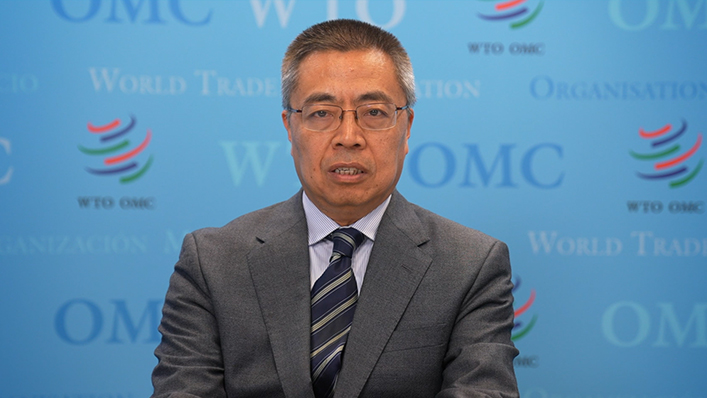
Excellencies,
Her Excellency, Rector of Universitas Gadjah Mada (UGM), Professor Ova Emilia,
Deputy Minister of Trade, Dr. Jerry Sambuaga,
Mr. Yudi Triantoro, representing the Ministry of Foreign Affairs of the Government of Indonesia,
H.E. Vice-Speaker for Industry and Development of the House of Representatives of the Republic of Indonesia
Your Excellencies, Ambassadors of Latin American, Caribbean countries in Jakarta
Your Excellencies, Ambassadors of Southeast Asian countries
Distinguished professors,
Representatives of various organizations, and guests, Ladies and gentlemen,
It is my great pleasure to welcome you all and deliver a few opening remarks at the International Forum for Inclusive and Sustainable Development in the Southeast Asia, Latin America and the Caribbean (SEA-LAC) Region organised by the Universitas Gadjah Mada, which holds WCP Chair in Indonesia.
Firstly, as the DDG responsible for the WTO Chairs Programme, the WTO’s academic outreach and technical assistance, let me take the opportunity to sincerely thank Dr. Riza Noer Arfani, our Indonesian chairholder of the WTO Chairs Programme, and his team, for his important work done on the circular economy concept and sustainable development.
The WTO Chairs Programme aims to support and promote trade-related academic activities carried out by universities and research institutions in developing and least developed countries (LDCs).
Launched in 2009, the WTO Chairs Programme currently consists of 36 Chairs around the globe, 17 of which represent the latest Phase of the Programme.
The WTO Chairs Programme has contributed to the achievement of the WTO mandate relating to technical assistance, I value very much applied research to support policy makers in their trade policy formulation.
The COVID-19 pandemic along with the current food security and energy crises have created unprecedented opportunities to rethink current economic models, to design coordinated actions and to develop strategies to build a more resilient and greener low-carbon emission economic recovery. The most recent COP session in Sharm-el-Sheikh reminds us of this imperative for the survival of human civilization.
From that perspective, the circular economy approach opens up the way for green recovery and sustainable development that reduces the generation of waste and the depletion of dwindling natural resources. It not only addresses the negative impacts of the traditional “linear” economic model which exploits resources, manufactures them into products and disposes of waste; More importantly, it envisions a shift in paradigms based on a regenerative economic design where resources are reused, remanufactured and recycled. This generates economic resilience, generates business and trade opportunities, and provides environmental, development and societal benefits.
As evidenced by the research of many scientists, the circular economy creates new opportunities through saving resources, improved human health and sustainable environmental outcomes, but also for trade and economic diversification in developing countries. Members have started putting in place economic policies and measures promoting the circular economy and they are widely trying to do so without creating incidental obstacles to trade. Therefore, it becomes increasingly important to ensure that trade policies are designed and implemented with the goals of a circular economy in mind. Not doing so would be a missed opportunity, given the unique role of trade to scale up circular economy solutions and sustainable development worldwide.
At the WTO, Members have considered circular economy related issues through policy dialogues like this one between academia and policymakers organised under the auspices of the Chairs Programme, but also through areas negotiated under the Committee on Trade and Environment. The Aid for Trade initiative has also significantly contributed to include such issues in supporting efforts in developing countries to seize the potential environmental, economic, and social benefits of a circular economy through enhanced trade.
As an illustration, WTO members are engaging in informal dialogues on plastics pollution and environmentally sustainable plastics trade (IDP) to discuss how the Organisation can contribute to strengthening policy coherence and exploring collective approaches among the membership. Technical assistance and capacity building being an important contribution in supporting global effort to reduce plastic waste and move towards a circular plastics economy. These problem areas cannot be solved at national levels, they require concerted action on a global scale. This is why I welcome that representatives from the ASEAN region but also from Latin America and the Caribbean are present at this important conference. I wish you engaged discussions, and call upon you to develop concrete policy suggestions for policymakers and other stakeholders participating in the impressive conference featuring wide-ranging sessions throughout the coming week.
Let me conclude by saying that it is crucial to improve our collective understanding of how trade flows, policies and regulations interact with the new approaches to a circular economy; we need to build trust and confidence to engage in mutually beneficial activities in key areas of the circular economy.
I welcome this International Forum for Inclusive and Sustainable Development in the Southeast Asia, Latin America and the Caribbean (SEA-LAC) Region that looks in a very practical way at new frontiers of circular economy questions in multi-faceted areas. In all these ways, the research projects support efforts in developing countries to seize the potential environmental, economic and social benefits of a circular economy through enhanced trade.
I am looking forward to hearing your thoughts on all these issues and possible ways forward that ideally could be published as an output of this important initiative and in order to build a stronger global economy which will not only cope with the current crises but will also be greener and more inclusive, leaving no one behind. Trade is a driver of inclusiveness and addressing trade as a way to promote circular economy is also a strategic opportunity. Thank you for your attention. I wish you all and this Forum much success and fruitful further work.
Share
Reach us to explore global export and import deals